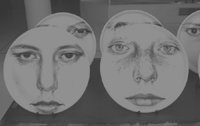Jeanne: The kids don’t say much.
Georges: The writer didn’t give them much to say.
Georges: The writer didn’t give them much to say.
Jeanne: Best line they gave Hugo was, “Maybe that's why a broken
machine always makes me a little sad, because it isn't able to do what it was
meant to do... Maybe it's the same with people. If you lose your purpose...
it's like you're broken.”
 Georges: But the cinematography, the visuals, the sound,
Jeanne. Brilliant. As magical as Méliès.
Georges: But the cinematography, the visuals, the sound,
Jeanne. Brilliant. As magical as Méliès.Jeanne: You were always a vision person, Georges. You gave them icons. But I was an actress. In silent films. I always wanted to say something.
________________
Voice-over
Scorsese has given us Hugo. Beautiful film. Jeanne wishes there
had been more dialogue. But Méliès’ films were silent, accompanied by music.
Hugo is almost a silent film with music, punctuated with snatches of dialogue.
Perhaps Scorsese intentionally reduced the dialogue as a tribute to Méliès.
...













2 comments:
Seems recently a sudden rush of filmmakers are looking back to the silent movie era. Hugo. The Artist. Some films are full of idle chatter, or unnecessary dialogue. They use words to tell the story when actions or scenes would be better. Or just not necessary at all like when a character is shouting “Let’s go, let’s go!” all the way through an action movie.
Charlie Chaplin used his whole body to express his words and his thoughts. When talking movies appeared, that art was lost, or at least diminished. Part of the art of acting is to communicate a message by using as few words as possible. And save the words for those messages that can only be transmitted verbally, like a joke, or an abstract situation. Actors sometimes practice by imagining they are in a silent movie and acting out their message.
Post a Comment